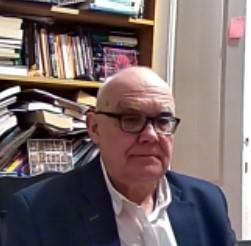Dr. Roman Krzanowski, Ph.D.

Dr. Roman Krzanowski, Ph.D. has graduate degrees in engineering, philosophy, and information science from universities in Poland, the UK, Canada, and the USA. He has a Ph.D. degree from UoL, London, UK, and a D.Phil. degree from The Pontifical University of John Paul II (UPJPII) in Krakow, Poland. He is currently an assistant professor at The Pontifical University of John Paul II.
Dr. Krzanowski's interests in philosophy include the philosophy of information and informatics, ontology and metaphysics (specifically those of computation science), epistemology of robotics, the philosophical foundations of AI, ethics and ethical problems of information societies, philosophy in technology, and the importation of ancient and traditional philosophies into modern problems.
Roman M. Krzanowski also has an extensive background in networking technologies (holding 30+ patents) spatial information systems, and information processing data analysis. He has published books in information science/AI (Spatial Evolutionary Modeling with J. Raper, OUP, 2001), network technology (Metro Ethernet Services for LTE Backhaul 2014 (Artech House Mobile Communications Library), philosophy of information (Ontological Information. Information in the Physical World, World scientific 2022), and Tae Kwon Do.
Dr. Krzanowski's research interests include:
- Philosophy of information and informatics: nature of information, physical information, ontology of information, surveillance societies, and the nature of computing artifacts.
- Philosophy of computing: ontology of computer models, epistemology of computer simulation, natural computing, non-Turing computational systems, ontology and epistemology of computer models
- Philosophy of AI: epistemology of robotics ethics, ethics of artificial systems, nature of artificial minds, natural language processing, and synthetic philosophy.
- Philosophy in technology: philosophical groundings of technology, nature of technological knowledge, and the impact of technologies on societies and individuals.
- Ethics: ethics in post-industrial societies, the nature and challenges of post humanism, ethical problems of information societies, modern ethical theories (Michael Sandel, Ralph Mcinerny), privacy and human values in the information age, phronesis in modern times.
- Philosophy General: nature of philosophy and philosophical thought, nature of philosophical wisdom, perennial questions of philosophy, non-formal argumentation, and the nature of science.
- Ancient Philosophy: the Pre-Socratics, Aristotle, Plato, and the import of ancient and traditional philosophies into modern problems.
ORCID: 0000-0002-8753-0957
Profile at ResearchGate



